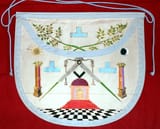Search Results
7/8/2025, 8:32:38 PM
>>509850929
>He chaired the governing body of the Grand Orient of France in 1799 and 1802. Heir to a substantial fortune and a noble title granted to his father, he embraced new ideas and viewed the Revolution with sympathy, but was imprisoned during the Terror after hiding the archives of the order. Roëttiers de Montaleau died on January 30, 1808. His religious funeral took place two days later, on February 1, at the Saint-Sulpice church in Paris. As for the Masonic lodges, they held numerous funeral ceremonies in his honor
>Alexandre-Louis Roëttiers de Montaleau is a key figure in the history of French Freemasonry. He played a vital role in the Grand Orient of France from the 1780s until his death in 1808
>Initiated at an imprecise date into the "L'Amitié" lodge in Paris, he was "raised to the rank of master" in Masonic terms in 1775. In this lodge, he served successively as Second Warden in 1775, Worshipful Master from 1778 to 1781 and from 1786 to 1778, a total of five years
>On December 26, 1783, he was received into the Philanthropic Society of Paris and served on its executive committee from 1784 to 1787
>Co-founder of the "Grand Chapitre Général," which transformed into the "Souverain Chapitre Métropolitain," de Montaleau was elected president on April 8, 1784, for approximately ten years, until 1793. As a deputy, he represented the chapters of Limoges, Rouen, Dieppe, and Aix-en-Provence
>From 1770 to 1777, Roëttiers de Montaleau held various officer positions in the Chamber of Provinces, before becoming its president until 1794. After this period in the Chamber, he was venerable of approximately ten metropolitan lodges
>The collective memory of Masons associates him more or less with two events: the survival of the Grand Orient during the Revolution and the establishment of the modern French Rite. Moreover, his career and personality are emblematic of a certain Masonic generation that passed the torch from the 18th to the 19th century
>He chaired the governing body of the Grand Orient of France in 1799 and 1802. Heir to a substantial fortune and a noble title granted to his father, he embraced new ideas and viewed the Revolution with sympathy, but was imprisoned during the Terror after hiding the archives of the order. Roëttiers de Montaleau died on January 30, 1808. His religious funeral took place two days later, on February 1, at the Saint-Sulpice church in Paris. As for the Masonic lodges, they held numerous funeral ceremonies in his honor
>Alexandre-Louis Roëttiers de Montaleau is a key figure in the history of French Freemasonry. He played a vital role in the Grand Orient of France from the 1780s until his death in 1808
>Initiated at an imprecise date into the "L'Amitié" lodge in Paris, he was "raised to the rank of master" in Masonic terms in 1775. In this lodge, he served successively as Second Warden in 1775, Worshipful Master from 1778 to 1781 and from 1786 to 1778, a total of five years
>On December 26, 1783, he was received into the Philanthropic Society of Paris and served on its executive committee from 1784 to 1787
>Co-founder of the "Grand Chapitre Général," which transformed into the "Souverain Chapitre Métropolitain," de Montaleau was elected president on April 8, 1784, for approximately ten years, until 1793. As a deputy, he represented the chapters of Limoges, Rouen, Dieppe, and Aix-en-Provence
>From 1770 to 1777, Roëttiers de Montaleau held various officer positions in the Chamber of Provinces, before becoming its president until 1794. After this period in the Chamber, he was venerable of approximately ten metropolitan lodges
>The collective memory of Masons associates him more or less with two events: the survival of the Grand Orient during the Revolution and the establishment of the modern French Rite. Moreover, his career and personality are emblematic of a certain Masonic generation that passed the torch from the 18th to the 19th century
Page 1
